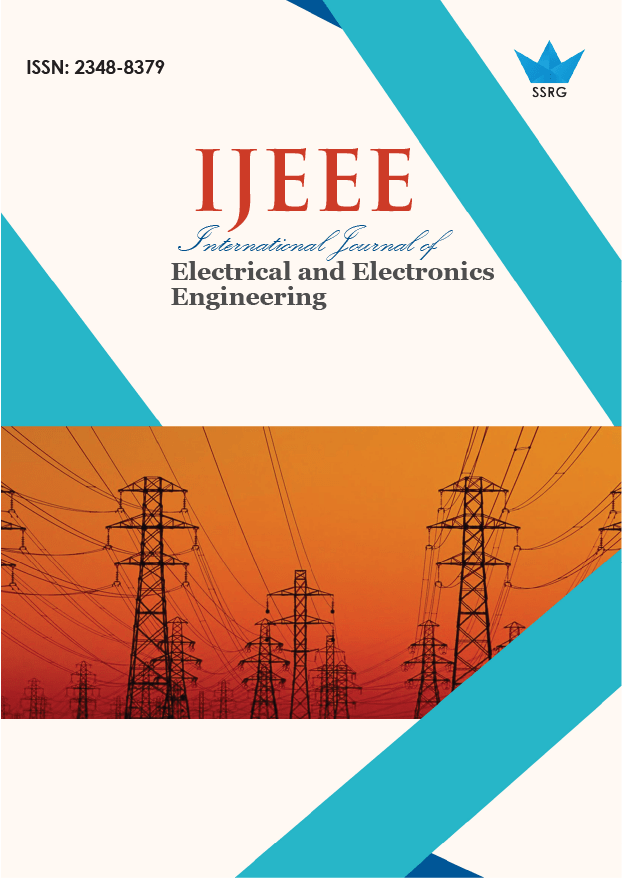Energy-Aware Task Offloading in Massive IoT Edge Network Using Optimized Convolutional Neural Network

| International Journal of Electrical and Electronics Engineering |
| © 2024 by SSRG - IJEEE Journal |
| Volume 11 Issue 11 |
| Year of Publication : 2024 |
| Authors : Shoukath Cherukat, J. Benita |
How to Cite?
Shoukath Cherukat, J. Benita, "Energy-Aware Task Offloading in Massive IoT Edge Network Using Optimized Convolutional Neural Network," SSRG International Journal of Electrical and Electronics Engineering, vol. 11, no. 11, pp. 424-437, 2024. Crossref, https://doi.org/10.14445/23488379/IJEEE-V11I11P139
Abstract:
The importance of the Internet of Things (IoT) devices is rising in this digital age. However, the high energy consumption of these devices limits their long-term functioning and efficiency. Task offloading technique in IoT is often used to address energy optimization. Conventional task offloading strategies lead to shorter lifespans and inefficient use of devices. Energy-aware task offloading is critical in IoT edge networks within the Mobile Edge Computing (MEC) environments to enhance resource utilization and reduce latency. This paper proposes an optimized Convolutional Neural Network (CNN) for efficient task offloading. The method efficiently predicts optimal offloading decisions using a comprehensive dataset that includes network characteristics, user behavior and resource utilization features. The optimized CNN architecture achieved notable performance with 91.075% accuracy, 91.82% precision, 91.07% recall, and 90.74% F1 score. These results showed that the model ensures efficient resource allocation and extends the operational life of IoT devices. The key findings highlight the potential of Deep Learning (DL) models in contributing to the energy-aware task offloading field in real-time adaptive decision making within the MEC environments.
Keywords:
Internet of Things, Energy optimization, Mobile Edge Computing, Deep Learning, Convolutional Neural Network.
References:
[1] Sahil Garg et al., “Security in IoT-Driven Mobile Edge Computing: New Paradigms, Challenges, and Opportunities,” IEEE Network, vol. 35, no. 5, pp. 298-305, 2021.
[CrossRef] [Google Scholar] [Publisher Link]
[2] Abdenacer Naouri et al., “A Novel Framework for Mobile-Edge Computing by Optimizing Task Offloading,” IEEE Internet of Things Journal, vol. 8, no. 16, pp. 13065-13076, 2021.
[CrossRef] [Google Scholar] [Publisher Link]
[3] Xuming An et al., “Joint Task Offloading and Resource Allocation for IoT Edge Computing with Sequential Task Dependency,” IEEE Internet of Things Journal, vol. 9, no. 17, pp. 16546-16561, 2022.
[CrossRef] [Google Scholar] [Publisher Link]
[4] Zhongjin Li et al., “Energy-Aware Task Offloading with Deadline Constraint in Mobile Edge Computing,” EURASIP Journal on Wireless Communications and Networking, vol. 2021, 2021.
[CrossRef] [Google Scholar] [Publisher Link]
[5] Abdelkarim Ben Sada et al., “Energy-Aware Selective Inference Task Offloading for Real-Time Edge Computing Applications,” IEEE Access, vol. 12, pp. 72924-72937, 2024.
[CrossRef] [Google Scholar] [Publisher Link]
[6] G. Pradeep et al., “Energy Prediction and Task Optimization for Efficient IoT Task Offloading and Management,” International Journal of Intelligent Systems and Applications in Engineering, vol. 12, no. 1s, pp. 411-427, 2023.
[CrossRef] [Google Scholar] [Publisher Link]
[7] Thar Baker et al., “EDITORS: Energy-Aware DynamIc Task Offloading Using Deep Reinforcement Transfer Learning in SDN-Enabled Edge Nodes,” Internet of Things, vol. 25, 2024.
[CrossRef] [Google Scholar] [Publisher Link]
[8] Ilyоs Abdullaev et al., “Task Offloading and Resource Allocation in IoT Based Mobile Edge Computing Using Deep Learning,” Computers, Materials & Continua, vol. 76, no. 2, pp. 1463-1477, 2023.
[CrossRef] [Google Scholar] [Publisher Link]
[9] Waleed Almuseelem, “Energy-Efficient and Security-Aware Task Offloading for Multi-Tier Edge-Cloud Computing Systems,” IEEE Access, vol. 11, pp. 66428-66439, 2023.
[CrossRef] [Google Scholar] [Publisher Link]
[10] Bassem Sellami, Akram Hakiri, and Sadok Ben Yahia, “Deep Reinforcement Learning for Energy-Aware Task Offloading in Join SDN-Blockchain 5G Massive IoT Edge Network,” Future Generation Computer Systems, vol. 137, pp. 363-379, 2022.
[CrossRef] [Google Scholar] [Publisher Link]
[11] Bassem Sellami et al., “Energy-Aware Task Scheduling and Offloading Using Deep Reinforcement Learning in SDN-Enabled IoT Network,” Computer Networks, vol. 210, 2022.
[CrossRef] [Google Scholar] [Publisher Link]
[12] Abhijeet Mahapatra et al., “An Energy-Aware Task Offloading and Load Balancing for Latency-Sensitive IoT Applications in the Fog-Cloud Continuum,” IEEE Access, vol. 12, pp. 14334-14349, 2024.
[CrossRef] [Google Scholar] [Publisher Link]
[13] Mingxiong Zhao et al., “Energy-Aware Task Offloading and Resource Allocation for Time-Sensitive Services in Mobile Edge Computing Systems,” IEEE Transactions on Vehicular Technology, vol. 70, no. 10, pp. 10925-10940, 2021.
[CrossRef] [Google Scholar] [Publisher Link]
[14] Jing Bi et al., “Energy-Aware Task Offloading with Genetic Particle Swarm Optimization in Hybrid Edge Computing,” 2021 IEEE International Conference on Systems, Man, and Cybernetics (SMC), Melbourne, Australia, pp. 3194-3199, 2021.
[CrossRef] [Google Scholar] [Publisher Link]
[15] Feng Wang, Jie Xu, and Shuguang Cui, “Optimal Energy Allocation and Task Offloading Policy for Wireless Powered Mobile Edge Computing Systems,” IEEE Transactions on Wireless Communications, vol. 19, no. 4, pp. 2443-2459, 2020.
[CrossRef] [Google Scholar] [Publisher Link]
[16] Youpeng Tu et al., “Task Offloading Based on LSTM Prediction and Deep Reinforcement Learning for Efficient Edge Computing in IoT,” Future Internet, vol. 14, no. 2, 2022.
[CrossRef] [Google Scholar] [Publisher Link]
[17] Gözde Karataş Baydoğmuş, “The Effects of Normalization and Standardization an Internet of Things Attack Detection,” Avrupa Bilim ve Teknoloji Dergisi, no. 29, pp. 187-192, 2021.
[CrossRef] [Google Scholar] [Publisher Link]
[18] Aleksandr Ometov, Anzhelika Mezina, and Jari Nurmi, “On Applicability of Imagery-Based CNN to Computational Offloading Location Selection,” IEEE Access, vol. 11, pp. 2433-2444, 2022.
[CrossRef] [Google Scholar] [Publisher Link]
[19] Huang Jin Jie, and Putra Wanda, “RunPool: A Dynamic Pooling Layer for Convolution Neural Network,” International Journal of Computational Intelligence Systems, vol. 13, no. 1, pp. 66-76, 2020.
[CrossRef] [Google Scholar] [Publisher Link]

 10.14445/23488379/IJEEE-V11I11P139
10.14445/23488379/IJEEE-V11I11P139